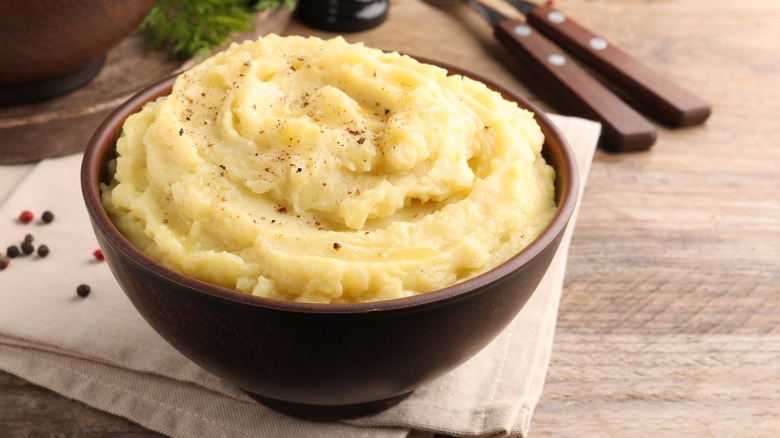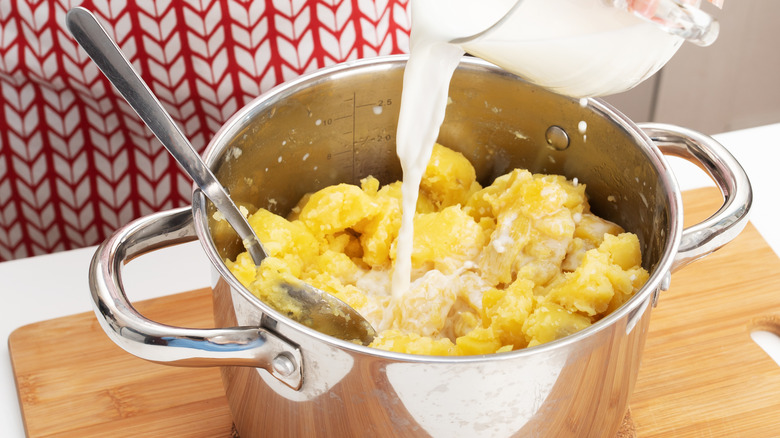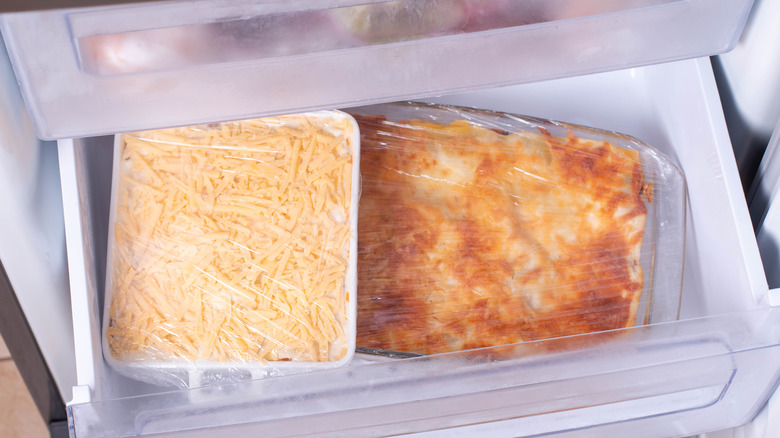Freeze A Batch Of Mashed Potatoes For All Your Holiday Parties
Let's be honest — the holidays can feel overwhelming, to say the least. Though you might be looking forward to a host of holiday parties with friends and loved ones, along with the delicious meals and moments you'll share, the idea of whipping up an array of dishes on the busiest days of the season can turn into another fraught to-do list item. However, making food in advance when you're less likely to be strapped for time can help ease that stress and make sure you still have at least some fun cooking. One dish that's easy to make ahead and stick in the freezer is mashed potatoes, since it's often prepared in large quantities anyway. It's hearty, rich, and luckily freezes well for months and thaws nicely overnight in the fridge.
You can make a batch or two of mashed potatoes a few days, weeks, or months ahead. Once they've cooled completely, transfer them to an airtight container (or cover them with a few layers of plastic wrap) to store safely in the freezer. When your festive holiday parties come around, you can simply thaw your spuds and reheat them in the stove, microwave, or oven. No one will know they weren't made fresh that day, and you'll save some precious energy so you can be present with the people you care about — a holiday win-win if you ask us.
For best results freezing mashed potatoes, don't skimp on the fat
Potatoes have a relatively high water content, which typically makes it tough to pop them in the freezer without ending up with unpleasant textures. Luckily, mashed potatoes fare quite well in a frozen state, provided you take the right approach. If you choose starchy potatoes over waxy ones (since they have a lower moisture content), and cook them through before mashing them, they won't end up mushy and freezer-burned.
The presence of fatty ingredients is also key to maintaining the texture of the dish so it's nice and creamy, as opposed to watery. When preparing your potatoes prior to freezing them, don't skimp on adding in the butter and cream. Be generous with the rich ingredients — they'll help keep your mashed potatoes nice and cohesive, but not gluey or sticky from excess moisture. To prevent ice crystals from forming on your freezer-ready dish, cover the surface of your mashed potatoes with a protective layer of water-resistant parchment or wax paper, then cover them well to create an airtight storage environment — for extra security, wrap the container in a few layers of plastic wrap.
How to reheat your potatoes like a make-ahead meal pro
When you're making a batch or two of mashed potatoes ahead of the holiday rush, first envision the serving occasions and specific parties you'll want to bring them to before portioning and freezing. Think about what quantities and storage formats are best for your unique plans. That way, you won't be scrambling to think of how many mashed potatoes you need for 10 hungry friends when you pull your dish out of the freezer.
If you prefer to heat your mashed potatoes easily in the microwave, store them in a microwave-safe bowl with a secure lid. Then, thaw the dish and heat it in gradual intervals. If you think you'll have oven space to reheat your mashed potatoes, store them in a casserole dish fit to serve a crowd — add some pats of butter (or even cheese) to the top prior to freezing, so it melts into the spuds as they warm up. For stovetop reheating, store your mashed potatoes in well-sealed freezer bags in smaller individual portions or large quantities, then transfer what you need to a saucepan.
Whatever re-heating method you choose, it usually helps to add in extra butter and cream and stir the mashed potatoes well as they warm through. Season with salt and pepper, then garnish with fresh chopped parsley or scallions. Most importantly, remember to relax and enjoy the fruits of your make-ahead holiday cooking efforts. And by fruits, we mean buttery and rich mashed potatoes.


